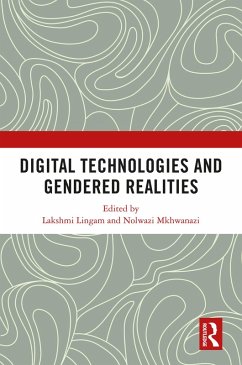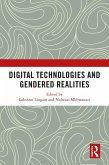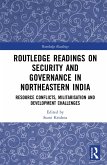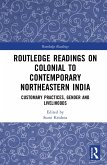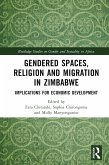Digital Technologies and Gendered Realities (eBook, PDF)
Redaktion: Lingam, Lakshmi; Mkhwanazi, Nolwazi
41,95 €
41,95 €
inkl. MwSt.
Sofort per Download lieferbar

21 °P sammeln
41,95 €
Als Download kaufen

41,95 €
inkl. MwSt.
Sofort per Download lieferbar

21 °P sammeln
Jetzt verschenken
Alle Infos zum eBook verschenken
41,95 €
inkl. MwSt.
Sofort per Download lieferbar
Alle Infos zum eBook verschenken

21 °P sammeln
Digital Technologies and Gendered Realities (eBook, PDF)
Redaktion: Lingam, Lakshmi; Mkhwanazi, Nolwazi
- Format: PDF
- Merkliste
- Auf die Merkliste
- Bewerten Bewerten
- Teilen
- Produkt teilen
- Produkterinnerung
- Produkterinnerung

Bitte loggen Sie sich zunächst in Ihr Kundenkonto ein oder registrieren Sie sich bei
bücher.de, um das eBook-Abo tolino select nutzen zu können.
Hier können Sie sich einloggen
Hier können Sie sich einloggen
Sie sind bereits eingeloggt. Klicken Sie auf 2. tolino select Abo, um fortzufahren.

Bitte loggen Sie sich zunächst in Ihr Kundenkonto ein oder registrieren Sie sich bei bücher.de, um das eBook-Abo tolino select nutzen zu können.
The book explores the varying experiences and engagement of youth with smartphones and digital technologies in India and South Africa. It examines the process of meaning-making (identity construction) garnered through smartphone technology - specifically relating to notions of love, sex, and sexuality.
- Geräte: PC
- mit Kopierschutz
- eBook Hilfe
Andere Kunden interessierten sich auch für
![Digital Technologies and Gendered Realities (eBook, ePUB) Digital Technologies and Gendered Realities (eBook, ePUB)]() Digital Technologies and Gendered Realities (eBook, ePUB)41,95 €
Digital Technologies and Gendered Realities (eBook, ePUB)41,95 €![Memetic War (eBook, PDF) Memetic War (eBook, PDF)]() Tine MunkMemetic War (eBook, PDF)20,95 €
Tine MunkMemetic War (eBook, PDF)20,95 €![Routledge Readings on Security and Governance in Northeastern India (eBook, PDF) Routledge Readings on Security and Governance in Northeastern India (eBook, PDF)]() Routledge Readings on Security and Governance in Northeastern India (eBook, PDF)41,95 €
Routledge Readings on Security and Governance in Northeastern India (eBook, PDF)41,95 €![Dissent with Love (eBook, PDF) Dissent with Love (eBook, PDF)]() Dissent with Love (eBook, PDF)41,95 €
Dissent with Love (eBook, PDF)41,95 €![Reporting Islam (eBook, PDF) Reporting Islam (eBook, PDF)]() Reporting Islam (eBook, PDF)25,95 €
Reporting Islam (eBook, PDF)25,95 €![Routledge Readings on Colonial to Contemporary Northeastern India (eBook, PDF) Routledge Readings on Colonial to Contemporary Northeastern India (eBook, PDF)]() Routledge Readings on Colonial to Contemporary Northeastern India (eBook, PDF)41,95 €
Routledge Readings on Colonial to Contemporary Northeastern India (eBook, PDF)41,95 €![Gendered Spaces, Religion and Migration in Zimbabwe (eBook, PDF) Gendered Spaces, Religion and Migration in Zimbabwe (eBook, PDF)]() Gendered Spaces, Religion and Migration in Zimbabwe (eBook, PDF)41,95 €
Gendered Spaces, Religion and Migration in Zimbabwe (eBook, PDF)41,95 €-
-
-
The book explores the varying experiences and engagement of youth with smartphones and digital technologies in India and South Africa. It examines the process of meaning-making (identity construction) garnered through smartphone technology - specifically relating to notions of love, sex, and sexuality.
Dieser Download kann aus rechtlichen Gründen nur mit Rechnungsadresse in A, B, BG, CY, CZ, D, DK, EW, E, FIN, F, GR, HR, H, IRL, I, LT, L, LR, M, NL, PL, P, R, S, SLO, SK ausgeliefert werden.
Produktdetails
- Produktdetails
- Verlag: Taylor & Francis eBooks
- Seitenzahl: 264
- Erscheinungstermin: 13. September 2024
- Englisch
- ISBN-13: 9781040124956
- Artikelnr.: 72282838
- Verlag: Taylor & Francis eBooks
- Seitenzahl: 264
- Erscheinungstermin: 13. September 2024
- Englisch
- ISBN-13: 9781040124956
- Artikelnr.: 72282838
- Herstellerkennzeichnung Die Herstellerinformationen sind derzeit nicht verfügbar.
Lakshmi Lingam was the Dean and Professor of the School of Media and Cultural Studies, Tata Institute of Social Sciences, Mumbai, India, till February 2023, when she superannuated after working at the Institute for nearly 35 years. Currently, she is a Chair Professor with the School of Public Health at the D Y Patil University, Navi Mumbai, India. Lakshmi's research interests lie in researching gender, employment, health, public policies, social movements, sexualities, social inequalities and digital citizenship. Nolwazi Mkhwanazi is a Professor of anthropology and Deputy Director of the Centre for the Advancement of Scholarship at the University of Pretoria, South Africa. Nolwazi's research focuses on youth sexuality, sex education, and sexual health interventions. Her current project is called Reimagining Reproduction: Making Babies, Making Kin and Citizens in Africa.
1. Smartphones, Surveillance, Power and Digital Lives: Connecting India and
South Africa Part I: Social Media & Digital Apps: Technology of the Self
2. Living the #blessed life: Compensated relationships and social media in
Johannesburg 3. Ladies first? How Heterosexual Women Navigate the Gendered
World of Online 4. Public Displays of Affection: Experiences of Youth as
they Negotiate Private and Public Love 5. Mobility, mediation and multiple
men: an exploration of the role of mobile phones in young women's sexual
partnerships and social networks in Khayelitsha, Cape Town Part II:
Production of 'good girls' within the Context of Disruptive Technologies
6. Mobile phones and "Good Muslim Women": Narratives of young women from
the old city of Hyderabad, India 7. "Good girls" and "smart boys": Mobile
Phones and the Social Reproduction of Gender 8. Mobile Phones, Control and
Violence: Experiences from Gujarat Part III: Surveillance, Gendered
Negotiations and Legal Meanings 9. Young Women's Engagement with the
mobile: Meaning in the family justice world 10. Gendered Surveillance,
Family Connections and Conflicts: An Ethnographic Perspective on Mobile
Phone Usage by Migrant Brides in North India Part IV: Unpacking 'Digital
Natives', Policy and Technology-supported Interventions 11. Between Panic
and Protection: Children and Young People's Encounters with Online
Pornography 12. Gendered Use of Mobile Technology among Young Children in
Urban India: Is there a Difference between the 'Haves' and the 'Have-Less'?
13. Kishor Varta: Using Information Communication Technology (ICT) for
changing gender discriminatory social norms among boys and young men in
Rajasthan, India
South Africa Part I: Social Media & Digital Apps: Technology of the Self
2. Living the #blessed life: Compensated relationships and social media in
Johannesburg 3. Ladies first? How Heterosexual Women Navigate the Gendered
World of Online 4. Public Displays of Affection: Experiences of Youth as
they Negotiate Private and Public Love 5. Mobility, mediation and multiple
men: an exploration of the role of mobile phones in young women's sexual
partnerships and social networks in Khayelitsha, Cape Town Part II:
Production of 'good girls' within the Context of Disruptive Technologies
6. Mobile phones and "Good Muslim Women": Narratives of young women from
the old city of Hyderabad, India 7. "Good girls" and "smart boys": Mobile
Phones and the Social Reproduction of Gender 8. Mobile Phones, Control and
Violence: Experiences from Gujarat Part III: Surveillance, Gendered
Negotiations and Legal Meanings 9. Young Women's Engagement with the
mobile: Meaning in the family justice world 10. Gendered Surveillance,
Family Connections and Conflicts: An Ethnographic Perspective on Mobile
Phone Usage by Migrant Brides in North India Part IV: Unpacking 'Digital
Natives', Policy and Technology-supported Interventions 11. Between Panic
and Protection: Children and Young People's Encounters with Online
Pornography 12. Gendered Use of Mobile Technology among Young Children in
Urban India: Is there a Difference between the 'Haves' and the 'Have-Less'?
13. Kishor Varta: Using Information Communication Technology (ICT) for
changing gender discriminatory social norms among boys and young men in
Rajasthan, India
1. Smartphones, Surveillance, Power and Digital Lives: Connecting India and
South Africa Part I: Social Media & Digital Apps: Technology of the Self
2. Living the #blessed life: Compensated relationships and social media in
Johannesburg 3. Ladies first? How Heterosexual Women Navigate the Gendered
World of Online 4. Public Displays of Affection: Experiences of Youth as
they Negotiate Private and Public Love 5. Mobility, mediation and multiple
men: an exploration of the role of mobile phones in young women's sexual
partnerships and social networks in Khayelitsha, Cape Town Part II:
Production of 'good girls' within the Context of Disruptive Technologies
6. Mobile phones and "Good Muslim Women": Narratives of young women from
the old city of Hyderabad, India 7. "Good girls" and "smart boys": Mobile
Phones and the Social Reproduction of Gender 8. Mobile Phones, Control and
Violence: Experiences from Gujarat Part III: Surveillance, Gendered
Negotiations and Legal Meanings 9. Young Women's Engagement with the
mobile: Meaning in the family justice world 10. Gendered Surveillance,
Family Connections and Conflicts: An Ethnographic Perspective on Mobile
Phone Usage by Migrant Brides in North India Part IV: Unpacking 'Digital
Natives', Policy and Technology-supported Interventions 11. Between Panic
and Protection: Children and Young People's Encounters with Online
Pornography 12. Gendered Use of Mobile Technology among Young Children in
Urban India: Is there a Difference between the 'Haves' and the 'Have-Less'?
13. Kishor Varta: Using Information Communication Technology (ICT) for
changing gender discriminatory social norms among boys and young men in
Rajasthan, India
South Africa Part I: Social Media & Digital Apps: Technology of the Self
2. Living the #blessed life: Compensated relationships and social media in
Johannesburg 3. Ladies first? How Heterosexual Women Navigate the Gendered
World of Online 4. Public Displays of Affection: Experiences of Youth as
they Negotiate Private and Public Love 5. Mobility, mediation and multiple
men: an exploration of the role of mobile phones in young women's sexual
partnerships and social networks in Khayelitsha, Cape Town Part II:
Production of 'good girls' within the Context of Disruptive Technologies
6. Mobile phones and "Good Muslim Women": Narratives of young women from
the old city of Hyderabad, India 7. "Good girls" and "smart boys": Mobile
Phones and the Social Reproduction of Gender 8. Mobile Phones, Control and
Violence: Experiences from Gujarat Part III: Surveillance, Gendered
Negotiations and Legal Meanings 9. Young Women's Engagement with the
mobile: Meaning in the family justice world 10. Gendered Surveillance,
Family Connections and Conflicts: An Ethnographic Perspective on Mobile
Phone Usage by Migrant Brides in North India Part IV: Unpacking 'Digital
Natives', Policy and Technology-supported Interventions 11. Between Panic
and Protection: Children and Young People's Encounters with Online
Pornography 12. Gendered Use of Mobile Technology among Young Children in
Urban India: Is there a Difference between the 'Haves' and the 'Have-Less'?
13. Kishor Varta: Using Information Communication Technology (ICT) for
changing gender discriminatory social norms among boys and young men in
Rajasthan, India
